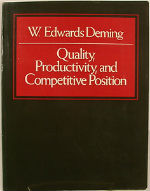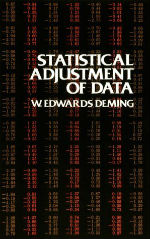
"Long-term commitment to new learning and new philosophy is required of any management that seeks transformation. The timid and the fainthearted, and the people that expect quick results, are doomed to disappointment."
According to W. Edwards Deming, American companies require nothing less than a transformation of management style and of governmental relations with industry. In Out of the Crisis, originally published in 1986, Deming offers a theory of management based on his famous 14 Points for Management. Management's failure to plan for the future, he claims, brings about loss of market, which brings about loss of jobs. Management must be judged not only by the quarterly dividend, but by innovative plans to stay in business, protect investment, ensure future dividends, and provide more jobs through improved product and service. In simple, direct language, he explains the principles of management transformation and how to apply them.


"... competition, we see now, is destructive. It would be better if everyone would work together as a system, with the aim for everybody to win. What we need is cooperation and transformation to a new style of management."
In this book W. Edwards Deming details the system of transformation that underlies the 14 Points for Management presented in Out of the Crisis. The system of profound knowledge, as it is called, consists of four parts: appreciation for a system, knowledge about variation, theory of knowledge, and psychology. Describing prevailing management style as a prison, Deming shows how a style based on cooperation rather than competition can help people develop joy in work and learning at the same time that it brings about long-term success in the market. Indicative of Deming's philosophy is his advice to abolish performance reviews on the job and grades in school.


"Long-term commitment to new learning and new philosophy is required of any management that seeks transformation. The timid and the fainthearted, and the people that expect quick results, are doomed to disappointment."
The MIT Center for Advanced Engineering published this text in 1982. Deming offers a theory of management based on his famous 14 Points for Management. Management's failure to plan for the future brings about loss of market, which brings about loss of jobs. Management must be judged not only by the quarterly dividend, but by innovative plans to stay in business, protect investment, ensure future dividends, and provide more jobs through improved products and services. 

Walter Andrew Shewhart was an American physicist, engineer and statistician, sometimes known as the father of statistical quality control. This historical text offers lucid explanation of how to regulate variables and maintain control over statistics in order to achieve quality control over manufactured products, crops and data. Topics include statistical control, establishing limits of variability, measurements of physical properties and constants, and specification of accuracy and precision.


Introduction to basic statistical concepts and to concept of "adjustment" also covers solution by least squares of more complicated problems and takes into account the propagation of error, general problem of least squares, and conditions without parameters.


The Wiley Classics Library consists of selected books that have become recognized classics in their respective fields. With these new unabridged and inexpensive editions, Wiley hopes to extend the life of these important works by making them available to future generations of mathematicians and scientists./


Analysis of the problems, theory, and design of sampling techniques for social scientists, industrial managers, and others who find statistics increasingly important in their work. Only college algebra assumed. Illustrated with dozens of actual large-scale surveys in government and industry. "The 'bible' of sampling statisticians." — American Statistical Association Journal. 1950 edition.